A special relationship – when Wales played the Basque Country
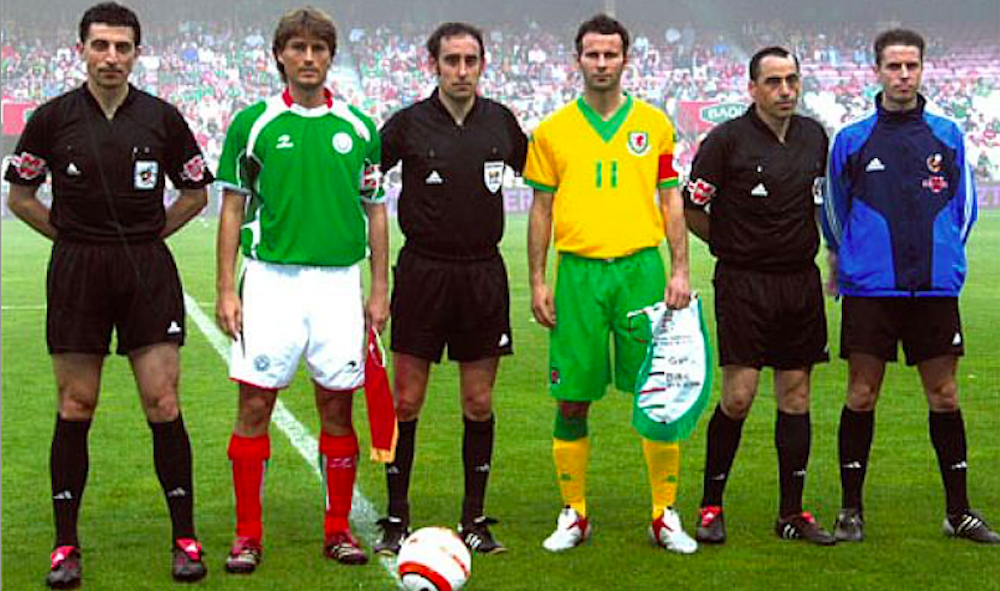
Christopher Evans
Fiercely proud and strong national identities, unique cultures, similar-size populations, rugged geography and depressingly wet climates. There is a special relationship between Wales and the Basque Country.
This kinship can be attributed to a variety of factors. Pioneers of the industrial revolution in Europe, both have vehemently defended their cultures and repressed ancient languages (Cymraeg and Euskera, respectively). Overshadowed by their larger and more powerful neighbours, they take pride in their heritage, are egalitarian and partisan, but with a welcoming and internationalist outlook.
The desire for independence has always been high on the agenda in the Basque Country, something that is currently snowballing in Wales, particularly since the UK’s departure from the European Union.
Football also entwines. Indeed, former Welsh great John Toshack led the Basque club Real Sociedad during three separate spells, winning the Copa Del Rey in 1987 and became something of a hero to the Basques.
In an interview with The Western Mail in 2005, Toshack himself said: “There are so many similarities between this place and Wales, which might partly explain why I like it here so much.
“Just as Wales is different from England, so is this place (the Basque Country) very different from the Spain most people know. The locals are very, very proud, there is a terrific spirit amongst them, a special belonging, if you like. And they are incredibly passionate and partisan about their sport.”
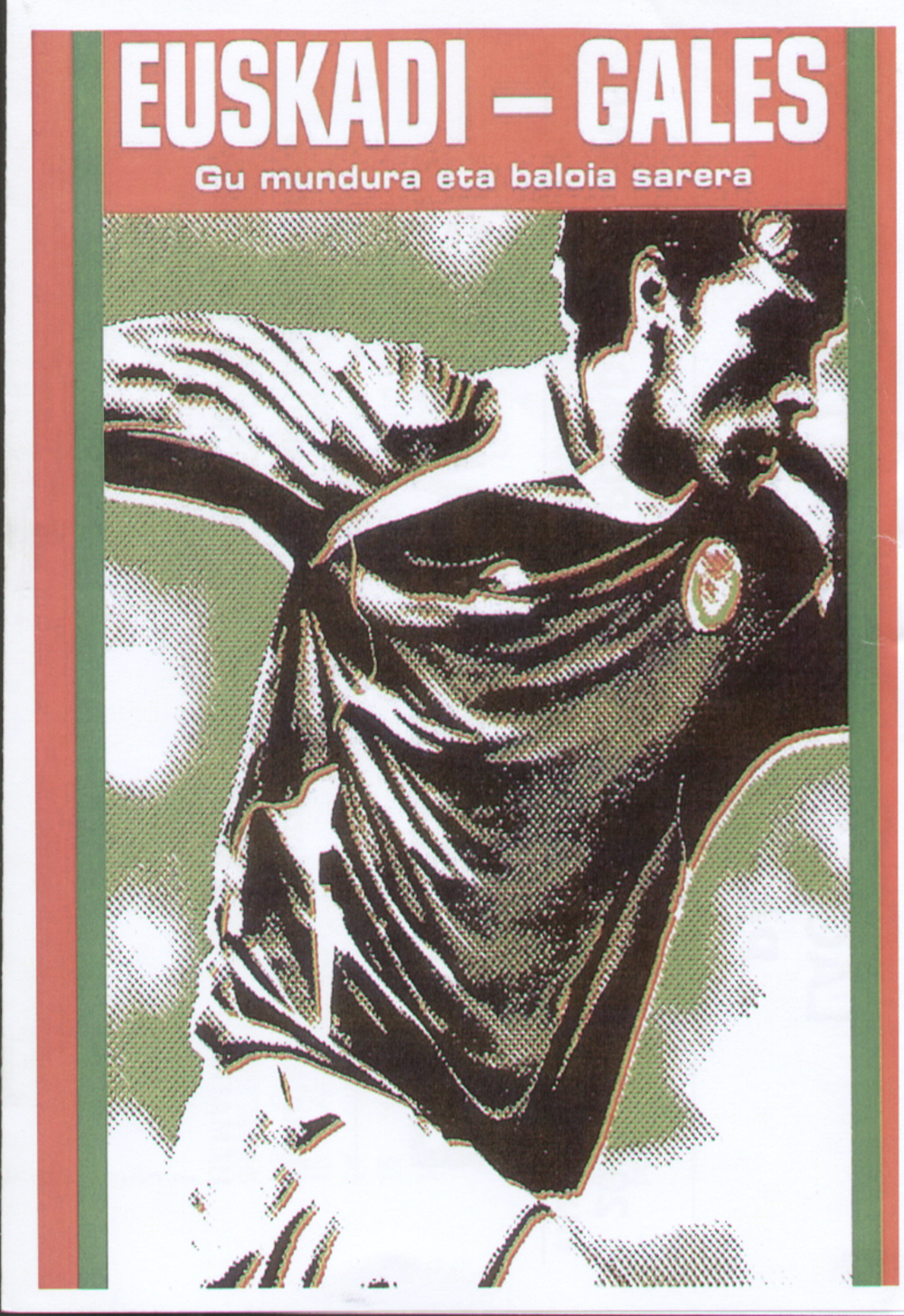
This rings true when talking about Basque football and in particular their biggest club, Athletic Club de Bilbao. Athletic’s unique La Cantera (“the quarry”) philosophy, where only players of Basque heritage or development can represent the club, is renowned around the footballing world. This policy was also adhered to from the 1960s by Real Sociedad, their Basque rivals in San Sebastián – until they signed former Newport County and Liverpool great John Aldridge in 1989.
Athletic believe in a focus on strong values and particularly the family values that are so prevalent in Basque culture. The youth players have a chore rota where they sort the kits and clean the changing rooms. This echoes a football culture of old, so different to the pampered and privileged modern-day youth players.
Many of them study for their degrees alongside football, as the club aim to prepare them for adulthood and a world outside of football. They are expected to set an example, as if they progress to Athletic’s first team these players become role models for a new generation of young Basques.
Loyalty is pivotal in Basque culture. This is evident with Athletic’s One-Club Man award that was introduced in 2015. The latest recipient – Welsh footballing legend Ryan Giggs.
The aforementioned was also the only goal-scorer in a unique and one-off friendly match between Wales and the Basque Country in 2006, organised by then Wales manager and revered honorary Basque John Toshack.
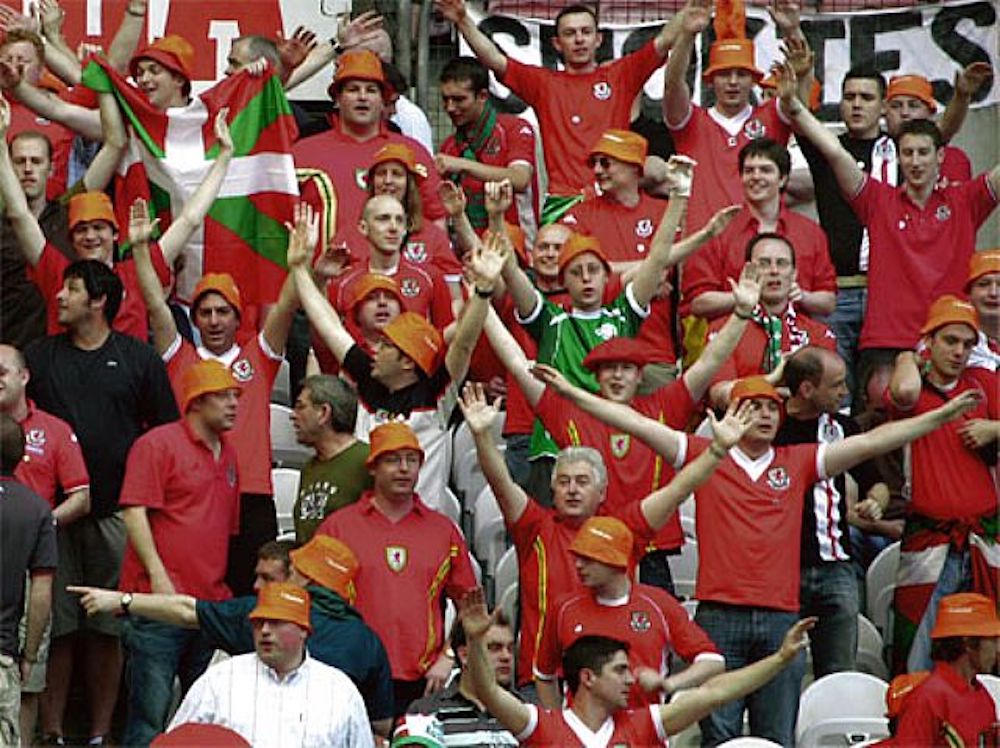
Although not officially recognised as a footballing nation, Euskadi or Euskal Selekzioa, have played international friendlies since 1915. Basque alumni to have pulled on the green jersey include Joseba Etxeberria, Julen Guerrero and Andoni Zubizarreta. More recently, Fernando Llorente, Iker Muniain and Iñaki Williams have represented the Basque Country with pride.
In 2020, the Basque Football Federation applied to be recognised by FIFA and UEFA to allow them to compete in international competitions.
Originally organised to take place on Saturday 20th May 2006, the match was postponed by a day following a double-booking of Bilbao’s San Mamés stadium (for a match between Athletic Bilbao and Barcelona).
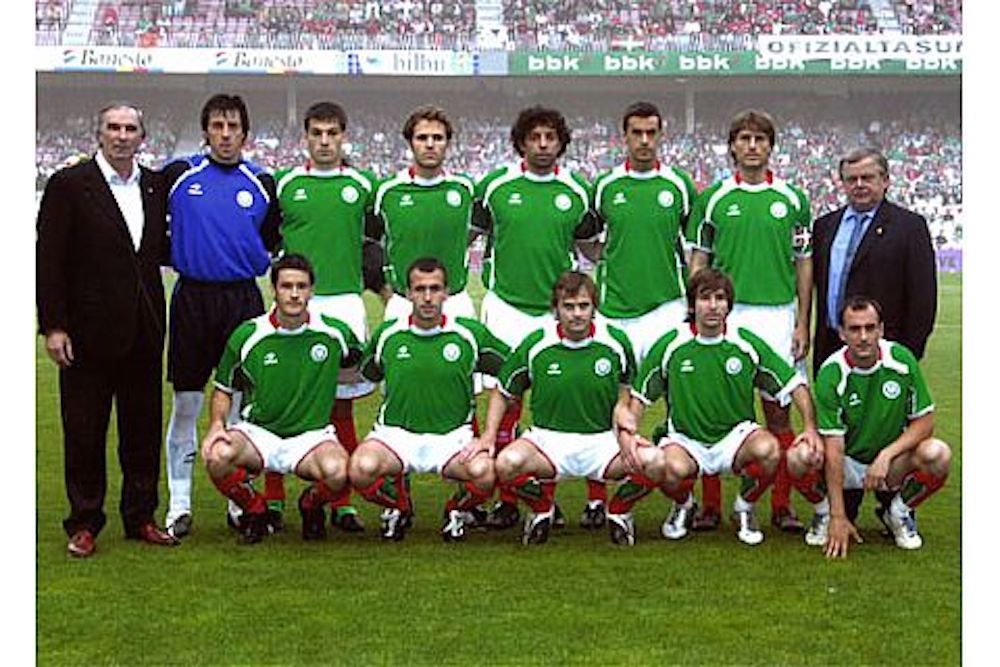
Wearing their yellow and green away strip for the occasion, the Welsh side included a blend of established and young players, continuing Toshack’s philosophy of blooding youth. This was something that began out of necessity during his spells with Real Sociedad, where he had no option but to use existing and youth players due to their then Basque-only policy.
Toshack believed that this stood him in good stead for his role as Wales manager, as he knew he could only work with what he had, with a focus on the youngsters he believed were good enough for the international stage. This blooding of youth would greatly benefit his successors Gary Speed and Chris Coleman.
In yet another link, Wales’ assistant manager was the Basque Salva Iriarte, who had worked in the same role under Toshack at Real Sociedad and had helped their talented youth players progress to the first team.
Playing at the heart of defence that day was 17-year-old Derby defender Lewin Nyatanga, who had become the youngest player to play for Wales two months earlier, making his debut against Paraguay at the Millennium Stadium on St David’s Day 2006 (this record was later taken by a certain Gareth Bale).
Nyatanga recalls the intimidating experience of the old San Mamés stadium (the new San Mamés opened in 2013). “What I remember most is that it had the steepest staircase I have ever known to get from the changing room down to the pitch. Then you had to go back up some more steps to get to the pitch! I remember the stadium was very tight, so the supporters were very close to the pitch. I remember doing the warm-up and thinking the pitch wasn’t very big and everything seemed really on top of you.”
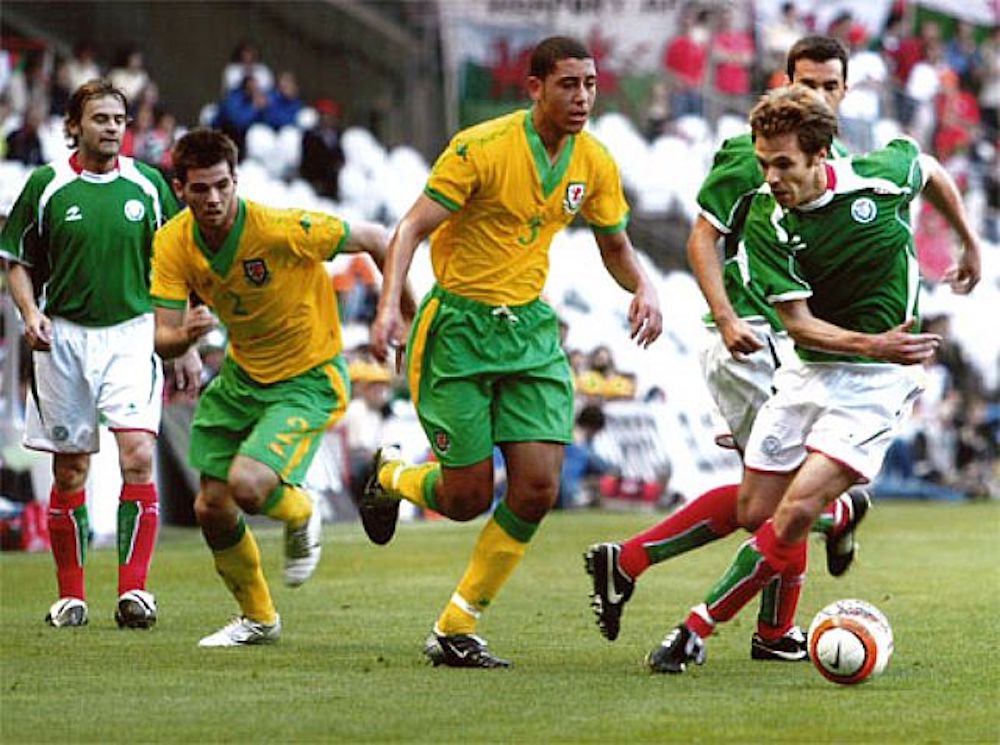
Remembering the game, Nyatanga says that it was a great experience that helped him develop as a player.
“I remember there was about five minutes to go and I got a telling off from Giggsy for not doing a tactical, or should I say professional foul to slow the game down!
“One of the Basque players turned on the counter-attack and passed it to their winger. Ryan came running over to me and said ‘you should’ve fouled him’.I think when you’re young you don’t quite understand how to win a game. They are things that you remember, learning from people like Giggs.”
The Basques almost took the lead early on, when Athletic Bilbao legend Julen Guerrero rounded Welsh keeper Paul Jones to slot home, only for Carl Robinson to deny him with a brilliant goal-line clearance. Fellow La Liga star Joseba Etxeberria then headed wide as the inexperienced Welsh defence struggled to get to grips with the game.
Nyatanga recalls the game finally settled after a frenetic start.
“It was at the end of the season, so there was a bit of a festival feel to it. Once we settled and the game got going it was actually quite a nice backdrop and atmosphere in the stadium.”
Notorious
This sentiment is shared by Mikel Etxarri, joint manager of the Euskal Selekzioa that day and former colleague of Toshack at Sociedad for eight years (during three separate spells).
Speaking from his Basque home, the 75-year-old said: “It was a game that was played on an unusual date for us, as we normally played around Christmas time. This game was played at the end of the season, but I remember the atmosphere was still very good.”
Etxarri’s co-manager was the notorious José Ángel Iribar, the imposing former Athletic Bilbao goalkeeper, captain and legend.
Iribar, who made 49 appearances for Spain, is infamous for a significant show of Basque political symbolism and solidarity. On 5th December 1976, just over a year after the death of fascist dictator Francisco Franco, Iribar and opposing captain Inaxio Kortabarria carried out the Ikurriña (the Basque flag) and placed it on the centre-circle before the Basque derby at Real Sociedad’s Atocha stadium.
This was the first public display of the flag since the death of the self-proclaimed El Caudillio (The Leader), even though it was still deemed illegal. This event is etched into Basque folklore.
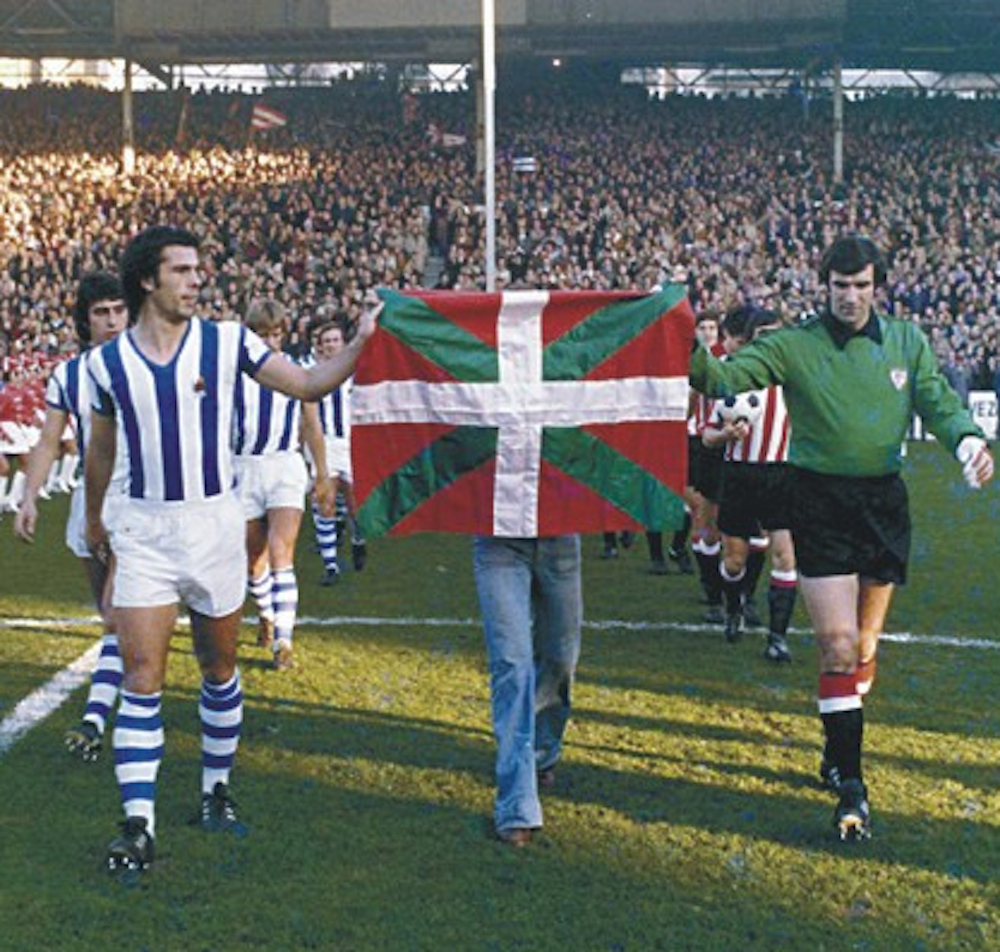
The Euskal Selekzioa included a number of La Liga stalwarts, including former Real Madrid and Bolton player Ivan Campo. Nyatanga says he enjoyed playing against the big-haired Basque. “He was playing in the Premier League at the time and for me he was a well-known and respected player to play against. Unfortunately, we were opposite ends as we were both defenders, but what a cultured player. You could tell why he had played for Real Madrid. The way he played; it was great to be on the same pitch as him.”
The more experienced players helped Wales to finally put their stamp on the game, with Simon Davies, Craig Bellamy and Ryan Giggs a calming influence on their younger teammates. Wales had been under pressure from the tenacious Basques for much of the game, but defended stoically as a team, using the pace of the tireless Bellamy as an attacking outlet.
In a further Welsh connection, coming on up front for the men in green that evening was Athletic Bilbao’s Fernando Llorente. The striker is loved in Swansea after an excellent season for the Jacks in the 2016/17 season, where he scored 15 goals in 33 appearances. El Rey León (The Lion King) would go on to have an illustrious career with Juventus, Seville, Tottenham and Napoli. “Llorente wasn’t really well known in England at the time,” Nyatanga recollects, “but when I look back you realise what a great player he was.”
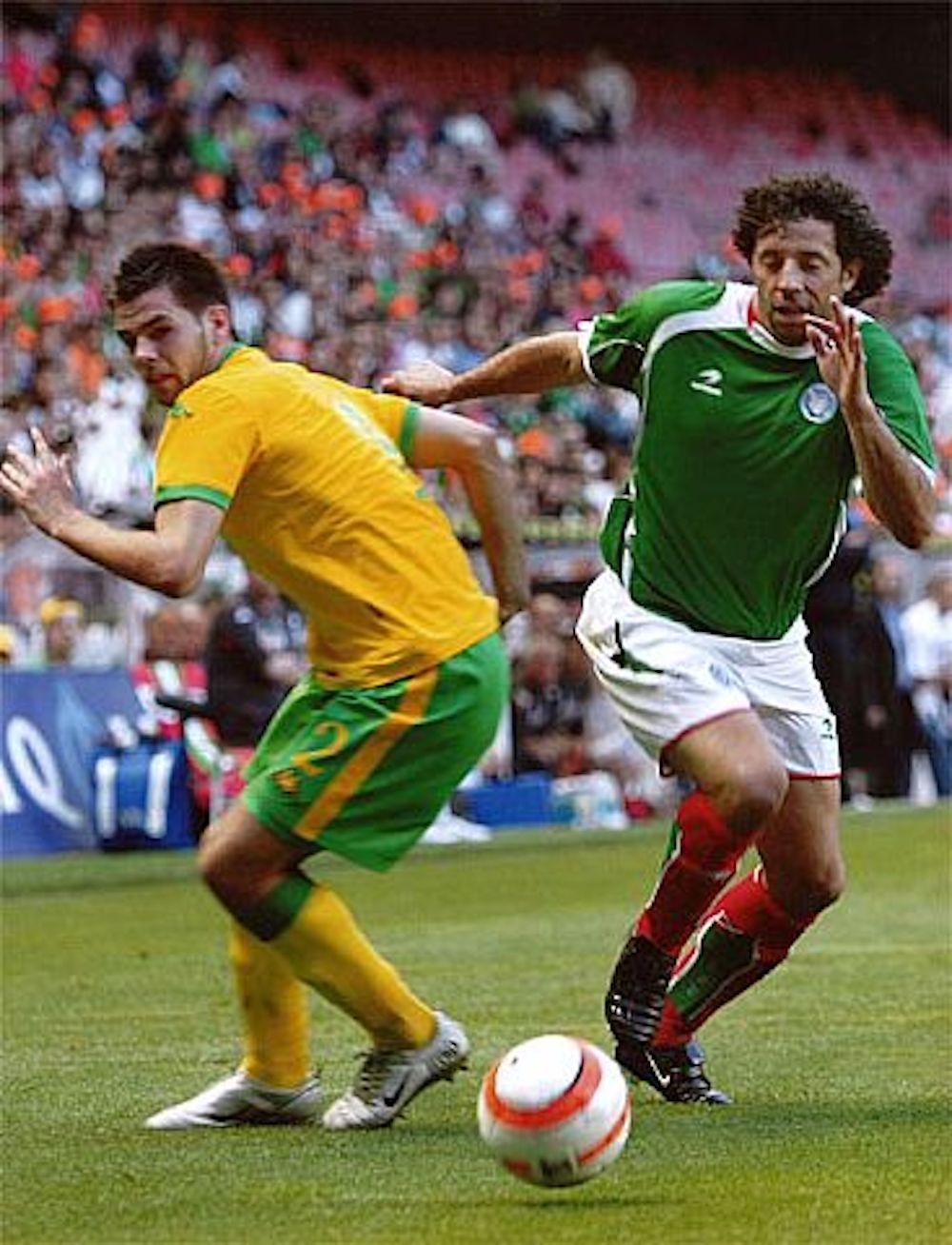
Nyatanga wasn’t the only young starter that day, a beardless and youthful-looking Joe Ledley impressed in an unfamiliar wing-back role, after injuries had forced Toshack to change to a 3-5-2 formation. A young Gareth Bale was on the bench in Bilbao, but the boy who went on to win four Champions’ Leagues with Real Madrid failed to get on to the pitch.
After soaking-up relentless pressure from the Basques, the only goal of the game came out of the blue in the 75th minute. “I remember the goal perfectly,” reflects Etxarri. “Giggs made the counter-attack from the inside right position and scored with a strong and low shot. It was extraordinary from the left-footed veteran!”
Etxarri is complimentary of his players who played that day, the defeat being only their second in 14 matches. He reserves special praise for Giggs, remembering his “magnificent left foot” and mazing dribbling skills. Somewhat amazingly, it was Giggs’ first appearance in an away friendly for Wales since he made his debut in 1991.
Discussing the possibility of being recognised as a nation by FIFA, Etxarri is not so optimistic. “I have many doubts about it, but you have to try.” However, he has no doubts about the potential of a Basque national team on the international stage. “I think that we would be a force in any competition. Let’s not forget that we had three players who were World Cup winners with Spain in 2010: Fernando Llorente, Javi Martinez and Xabi Alonso.”
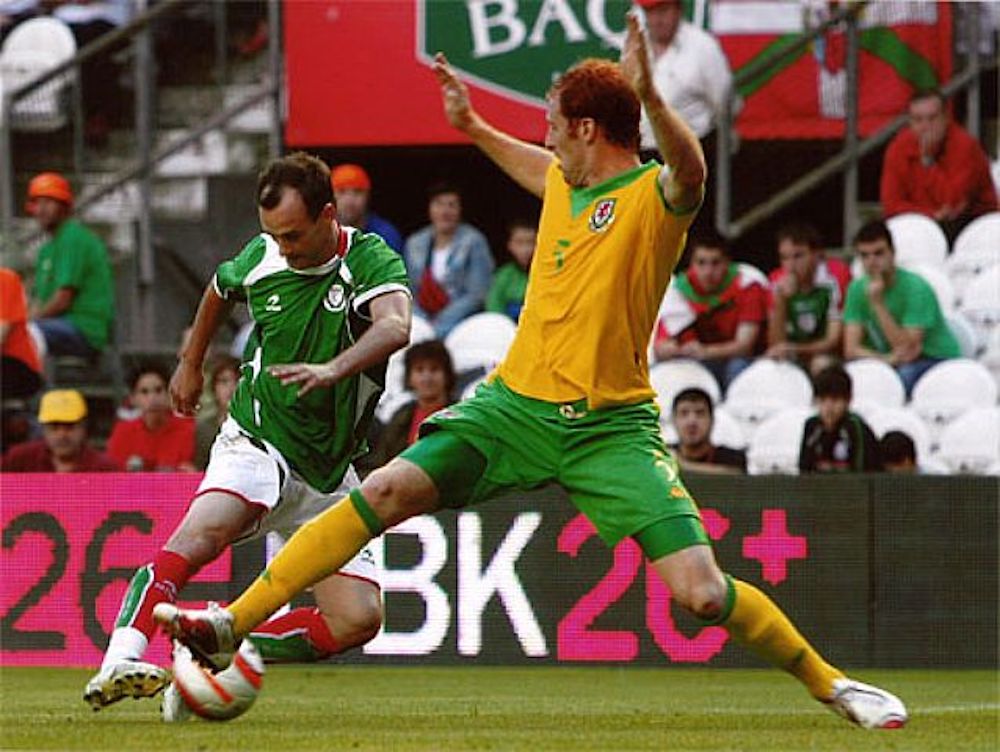
Xabi Prieto came close to equalising for the Basques, but Wales held on to a hard-fought victory. Nyatanga believes that Toshack’s tactical nous helped Wales win the game, as well as the team’s continued progress. “His style of play was very European, very slow and tactical, and this was way back when English football was fast and furious. I have nothing but gratitude for Toshack, without him I may have never played for Wales.”
The unique friendly in Bilbao highlights the cultural and political importance of football and the special relationship between Wales and the Basque Country. The Spanish Newspaper El Mundo reported that “the identity of Wales is a complex phenomenon. Sport in particular offers a very strong element of Welsh identity, proving to the world and to the Welsh that Wales is a different nation [from the UK]. It allows the Welsh to celebrate the existence of their country.”
It is the wish of the Basques to have similar rights, to proudly represent and celebrate their nation on the international sporting stage. As El Mundo stated “The PNV (Basque Nationalist Party) has made a strong commitment to projecting an image of Euskadi as a country differentiated from Spain through sports competitions and, specifically, through football, the sport that moves the masses.”
Only time will tell if the Basques will get their wish. It will be intriguing to see FIFA’s response to their request. Perhaps it is not too wishful thinking to imagine the next meeting of these kindred spirits will be in an official international capacity.
TEAMS
BASQUE COUNTRY
Lafuente (Bilbao) (Replaced by Riesgo 45’), Edu Alonso (Alaves) (Replaced by Sarriegi 45’),
Aitor Lopez Rekarte (Sociedad) (Replaced by Javid Garrido 45’), Ivan Campo (Bolton), Labaka (Sociedad), Patxi Puñal (Osasuna), Xabi Prieto (Sociedad), Julen Guerrero (Bilbao, captain), Joseba Etxeberria (Bilbao), Mikel Alonso (Sociedad), Gabilondo (Sociedad) (Replaced by Llorente 45’).
Substitutes: Riesgo (Sociedad), Sarriegi (Alaves), Iñaki Muñoz (Osasuna), Javi Garrido (Sociedad), Fernando Llorente (Bilbao).
Managers: José Ángel Iribar and Mikel Etxarri
WALES
Paul Jones (QPR), Joe Ledley (Cardiff), Lewin Nyatanga (Derby), Danny Gabbidon (West Ham), James Collins (West Ham), Carl Robinson (Norwich) (Replaced by Cotterill 72’), Carl Fletcher (West Ham), Craig Bellamy (Blackburn), Robert Earnshaw (Norwich) (Replaced by Andrew Crofts 56’), Simon Davies (Everton), Ryan Giggs (Man Utd, captain).
Subs: David Partridge (Bristol City), Andrew Crofts (Gillingham), David Vaughan (Crewe), David Cotterill (Bristol City) Gareth Bale (Southampton), Craig Davies (Verona), Lewis Price (Ipswich).
Manager: John Toshack
Referee: Eduardo Iturralde González (Spain)
Support our Nation today
For the price of a cup of coffee a month you can help us create an independent, not-for-profit, national news service for the people of Wales, by the people of Wales.







Wales and Basque Country face similar problems. I feel their pain and stand shoulder to shoulder with them
To be regarded as a lesser people. Your land invaded. Freedoms restricted, rights curtailed. Our ancient language and native culture removed in an act of ethic cleansing, history appropriated by a foreign foe that wants to wipe you from existence. As said, I feel your pain.
Welsh Nationalists can only dream of the separatist organisations of the Basque Country.
The some of a colonial administrator and two men who blew themselves up outside a post office?
ex Swansea player Angel Rangel and former player manager Roberto Martinez were also from the Basque Country
Catalania. Different place
A wonderful occasion that highlighted our solidarity. Far more of these matches with the likes of Euskadi, Catalunya and Galicia should be arranged. Currently there is too much emphasis in Welsh sporting circles on the Lions debacle, and the farcical “For Wales see England” cricket team.
On the less serious side, it is about as difficult to travel direct between Bilbao and San Sebastian as Cardiff to Aberystwyth. Image, roadside Gernika
see my earlier piece also
https://nation.cymru/opinion/football-on-the-edge-of-nationalism-wales-and-athletic-bilbao/